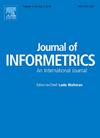Innovation lineage structure: A graph structure in publications of scholars and its association with disruptiveness
IF 3.5
2区 管理学
Q2 COMPUTER SCIENCE, INTERDISCIPLINARY APPLICATIONS
引用次数: 0
Abstract
Numerous factors have been associated with disruptive research that dramatically drives scientific development. However, few studies have explored the issue from the perspective of the publication structures of scholars. To fill the gap, we identified a graph publication structure, termed innovation lineage structure, from 110,488,521 publications in the OpenAlex database authored by 1523,664 scholars who began their careers in 1980 or later. Using logistic regression models, we found that publications within these structures were more disruptive than those outside. This finding remained robust across different disruptiveness measures, scholars of various genders, and within the natural and engineering sciences. Informed by career stages and knowledge diversity, we observed that scholars adopted exploration research strategies for research within their innovation lineage structures, leading to more disruptive impacts. The proposed innovation lineage structures are associated with disruptiveness and offer insights for scholars seeking greater impact, highlighting that publications grounded in novel work and characterized by persistent innovation are more likely to be disruptive.
创新谱系结构:学者论文中的图表结构及其与破坏性的关系
许多因素与颠覆性研究有关,这些研究极大地推动了科学发展。然而,很少有研究从学者发表结构的角度来探讨这一问题。为了填补这一空白,我们从OpenAlex数据库中的110,488,521篇论文中确定了一个图表出版结构,称为创新谱系结构,这些论文由1523,664名学者撰写,他们在1980年或之后开始他们的职业生涯。使用逻辑回归模型,我们发现这些结构内的出版物比外部的更具破坏性。这一发现在不同的破坏性衡量标准、不同性别的学者以及自然科学和工程科学领域都是强有力的。研究发现,受职业阶段和知识多样性的影响,学者在创新谱系结构中采用探索性研究策略,从而产生更大的破坏性影响。提出的创新谱系结构与破坏性有关,并为寻求更大影响的学者提供了见解,强调以新颖工作为基础并以持续创新为特征的出版物更有可能具有破坏性。
本文章由计算机程序翻译,如有差异,请以英文原文为准。
求助全文
约1分钟内获得全文
求助全文
来源期刊

Journal of Informetrics
Social Sciences-Library and Information Sciences
CiteScore
6.40
自引率
16.20%
发文量
95
期刊介绍:
Journal of Informetrics (JOI) publishes rigorous high-quality research on quantitative aspects of information science. The main focus of the journal is on topics in bibliometrics, scientometrics, webometrics, patentometrics, altmetrics and research evaluation. Contributions studying informetric problems using methods from other quantitative fields, such as mathematics, statistics, computer science, economics and econometrics, and network science, are especially encouraged. JOI publishes both theoretical and empirical work. In general, case studies, for instance a bibliometric analysis focusing on a specific research field or a specific country, are not considered suitable for publication in JOI, unless they contain innovative methodological elements.
 求助内容:
求助内容: 应助结果提醒方式:
应助结果提醒方式:


